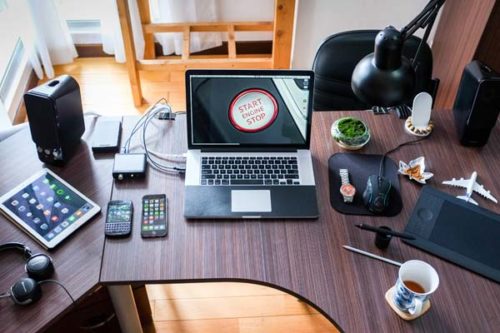Since you paid top dollar for the latest Phone or Laptop, it’s nice to show it off to co-workers and especially your clients. And since you own it, it is likely that you also know exactly how to use it or at least start off with a greater understanding compared with a new or unknown device. There are of course quite a few phones on the market, each with distinct capabilities or drawbacks and when you look at laptops there are a dizzying number of makes and models and a wide variety of specs. This is great for consumers as it lets them (hopefully) pick exactly what it right for them, but when it comes to the requirements of a company it may not be the best fit, and this is just the start.
The main benefit of letting employees bring their own device is that you would not have to bear the cost of providing it or maintaining it and eventually replacing it. Depending on the size of the company this could be quite a substantial saving! In the case of phones, letting employees use their own lets them avoid having to carry around two phones which they will appreciate, on the other hand they cant simply turn off their work phone if they only have a personal phone.
There are rather more downsides to the policy however, most of which can be serious. To start with all computers are not created equal as specifications are varied, some might have the latest high-performance spec whilst others are still plodding along with their 6-year-old brick, and some may be Mac users. This can have a large effect on productivity for one thing, and also presents certain challenges for IT staff who might have to wrestle with such varied computers in order to set up the company software, drivers or configure required security, worst case its simply not fit for purpose like many netbooks with limited storage and memory.
Devices can have their security policy determined by the company, which can help reduce risk. Not all operating systems will allow this however and employees might not appreciate control being taken away from them on their own devices. This leads into a very important point about control. If your employee brings their own phone or computer, you cannot completely control what they do with it, where it goes, who uses it, and what gets installed onto it. This creates a grave risk of not only spreading malware or viruses, but also of data loss or breaches should the device have information stored inside. Further to this point, should an employee leave a position, they will potentially be taking information and data with them, in the case of phones this could include client emails, phone numbers and other commercially sensitive data that could mean your ex-employee could start poaching clients for their new breakaway business because their personal number is still the main point of contact for the customers you used to have.
More and more the cloud is providing solutions to problems and this is no exception, if you are using web portals, online storage, online apps or perhaps a remote or virtual desktop system then many of the issues I’ve raised disappear as the devices are merely points of access to a system that exists outside of any single device. Its possible to use almost any computer to do work providing you sign in securely and have the Internet access.
It’s not just computers and phones, but potentially anything programmable. USB sticks are banned in many large companies such as IBM because of risks associated with them. But this can be extended to any device that may connect to your business systems that isn’t approved or allowed.
So will you fork out on new phone and computers for all your staff? With all the licences, leases, and IT personnel that go with that? And ensure that it’s all pinned down and under control? Or will you open the doors to the menagerie of devices and contraptions and just let your employees sort themselves out? There’s no broad answer as businesses are all different, but perhaps you are now able to make a better decision on which way to go with your company.
Ben
Ben is looking after our clients’ IT systems and backups, making sure their equipment and infrastructure are responsive and reliable.
If you would like to talk to Ben about anything mentioned in this article please let me know and I will ask him to contact you and answer your questions.
Kamila
General Manager
Octagon Technology Ltd


